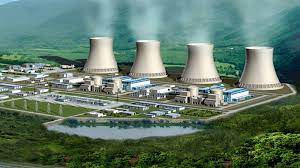Ministers of energy around the world seem to be agreeing that nuclear energy or atomic energy should be part of the global energy mix.
The ministers and policymakers who have been meeting in the US since Wednesday agree that nuclear should be at the forefront and the center to achieving emission reductions of the net zero ambitions in the coming years.
While this position is likely to be further amplified at the upcoming UN Climate Change Conference in Egypt (COP27) some insist that the decision to include nuclear is not just for politicians and industry to take.
They say public acceptance is crucial and their views must be considered. This position was part of the official statement of the UK government read at the International Atomic Energy Agency -IAEA 5th Ministerial Conference on nuclear power in the 21st century, Washington DC, US.
“Public acceptance is crucial and their views must be considered. In the United Kingdom, we fully recognize that early engagement with local communities is essential to build public support and inform policy-making,” reads the statement.
From the conference, it is clear that the world is likely to see more nuclear power plants constructed between now and 2050. But speakers and promoters of this technology as part of energy security say it is crucial that the public is consulted about the likely risks and benefits of nuclear energy.
The Nuclear Power and Energy Authority -NuPEA of Kenya Chief Executive Officer, Collins Juma is one of the experts from Africa who spoke at one of the side events at the Conference.
He, like Leoman Do Santos from Brazil and Kathyln Huff from the United States of America, agrees that the public especially where the nuclear reactors are to be established must accept the plants.
Kenya is one of the countries in East Africa that have moved ahead with plans for nuclear as part of the energy mix. Kenya should have the first 1,000 MW plant running by 2030 with an investment worth $5 billion.
Like Uganda, Kenya has zeroed in on the shores of Lake Victoria for its first nuclear power plant.Kenya’s other option is Lake Turkana or along the Indian Ocean. Uganda’s plant will very likely be based somewhere in Buyende, Collins Juma revealed that such consultations already kicked off with some of the leaders in Kenya. “Public acceptance is work in progress until you do the decommissioning,” urged Collins Juma.
The State Minister for Energy, Dr. Opolot Okasai in a statement said Uganda believes that maintaining a proper global nuclear safety and security regime will facilitate the sustainable utilization of nuclear energy for socio-economic development.
“With nuclear power prospects and the significant rise of atomic energy applications, Uganda is committed to strengthening the national infrastructure for nuclear Safety, Security and safeguards,” said Okasai.
The ministerial conference on nuclear came at a time when the International Energy Agency (IEA) was releasing its World Energy Outlook report 2022. The agency in a report released on Thursday.
The report projects more than a doubling of nuclear generation by 2050, with at least 30 countries increasing their use of nuclear power, in the Net Zero Emissions by 2050 scenario. While there is no turning back from nuclear energy, the US and UK governments have used the US ministerial conference to further lambast Russia’s occupation of Ukraine’s largest power plant in Zaporizhzhya.
“Each week we see flagrant disregard for core principles of nuclear safety and security by the Russian occupying forces, threatening the safety of millions; their illegal and reckless actions include the abuse and mistreatment of the Ukrainian staff working at the site, raising the risk of human error in a potential nuclear incident,” said the UK.
Dr. Kathryn Huff, the leader of the US Office of Nuclear Energy as the Assistant Secretary observed that war-afflicted zones are not enabling the environment for nuclear power plants.
While countries like the US plan to spend over 1.9 billion dollars on nuclear, countries in Africa say the adoption of nuclear as part of their energy mix will be hampered by a lack of financing.
source urn




